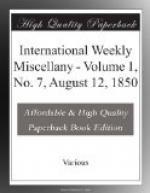Of the ministerial life of Sir Robert Peel little more remains to be related except that which properly belongs rather to the history of the country than to his individual biography. But it would be unjust to the memory of one of the most sagacious statesman that England ever produced to deny that his latest renunciation of political principles required but two short years to attest the vital necessity of that unqualified surrender. If the corn laws had been in existence at the period when the political system of the continent was shaken to its centre and dynasties crumbled into dust, a question would have been left in the hands of the democratic party of England, the force of which neither skill nor influence could then have evaded. Instead of broken friendships, shattered reputations for consistency, or diminished rents, the whole realm of England might have borne a fearful share in that storm of wreck and revolution which had its crisis in the 10th of April, 1848.
In the course of his long and eventful life many honors were conferred upon Sir Robert Peel. Wherever he went, and almost at all times, he attracted universal attention, and was always received with the highest consideration. At the close of 1836 the University of Glasgow elected him Lord Rector, and the conservatives of that city, in January, 1837, invited him to a banquet at which three thousand gentlemen assembled to do honor to their great political chief. But this was only one among many occasions on which he was “the great guest.” Perhaps the most remarkable of these banquets was that given to him in 1835 at Merchant Tailors’ Hall by three hundred members of the House of Commons. Many other circumstances might be related to illustrate the high position which Sir Robert Peel occupied. Anecdotes innumerable might be recorded to show the extraordinary influence in Parliament which made him “the great commoner” of the age; for Sir Robert Peel was not only a skillful and adroit debater, but by many degrees the most able and one of the most eloquent men in either house of parliament. Nothing could be more stately or imposing than the long array of sounding periods in which he expounded his doctrines, assailed his political adversaries, or vindicated his own policy. But when the whole land laments his loss, when England mourns the untimely fate of one of her noblest sons, the task of critical disquisition upon literary attainments or public oratory possesses little attraction. It may be left for calmer moments, and a more distant time, to investigate with unforgiving justice the sources of his errors, or to estimate the precise value of services which the public is now disposed to regard with no other feelings than those of unmingled gratitude.




